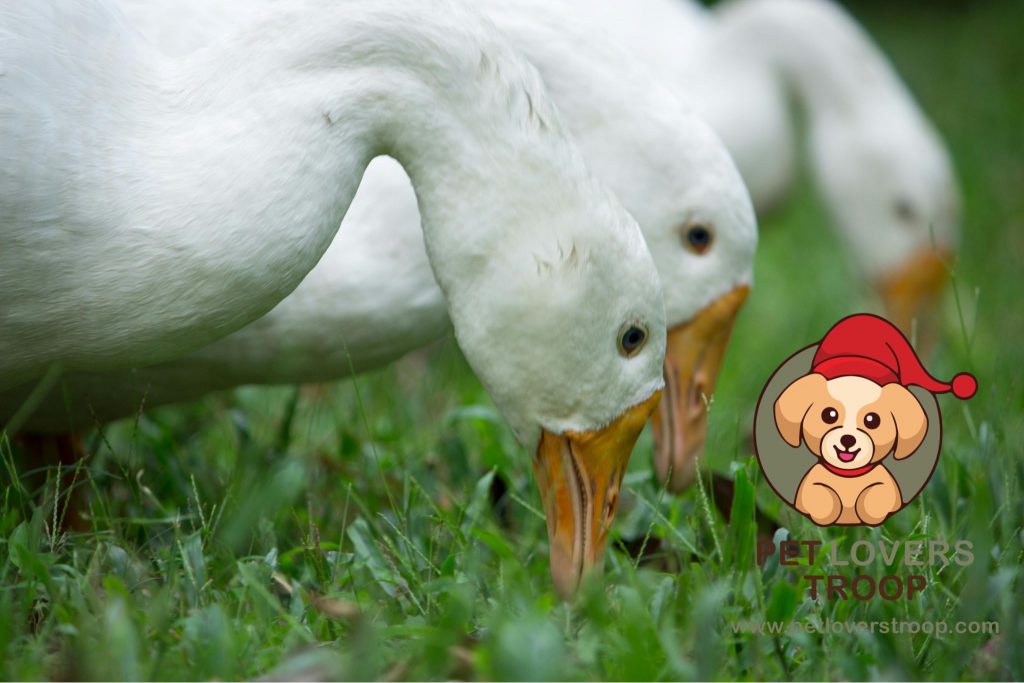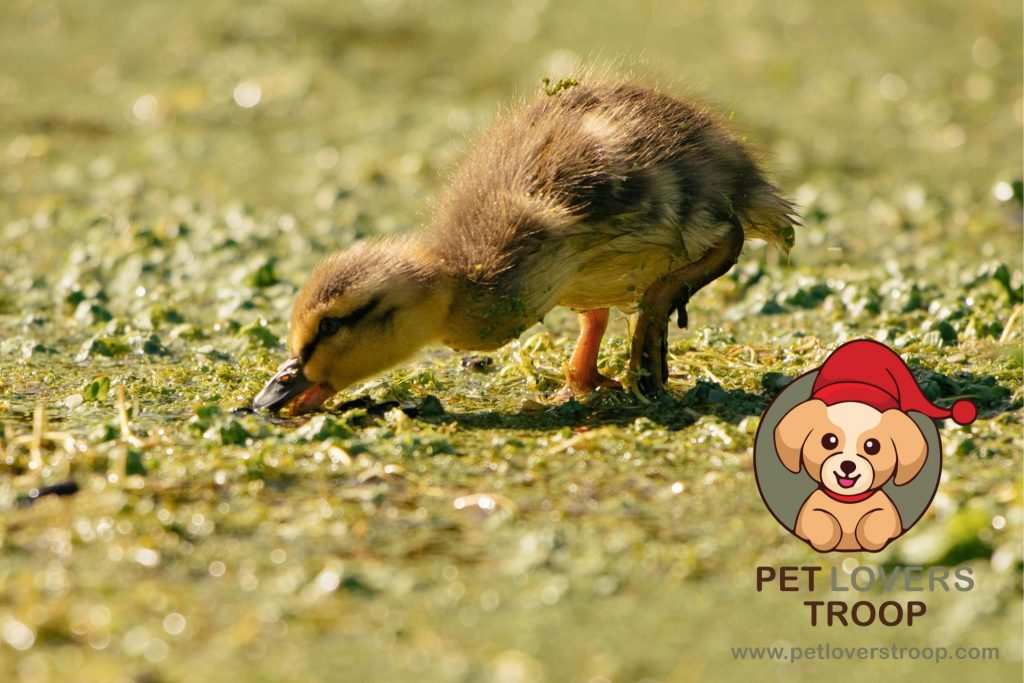Ducks are fascinating, friendly creatures that can make delightful pets or valuable farm animals. If you’ve ever owned ducks or thought about feeding ducks, you might be wondering: What foods should I provide for my ducks to avoid having them sickly or stressed all the time? Like in most animal care, one major factor that can really help your feathered friends is by feeding them the right duck feed.
Here in this ultimate guide, we will ensure that you learn all that you need to know about duck feeding that includes what feed is most suitable for ducks, and what to feed ducks from a young age up to adulthood. We will also be able to answer usual queries such as Can I feed bread to ducks? and information on how to ensure your ducks remain happy and healthy.
Whether you are raising ducks for production or as pets, then proper feeding of the ducks is important. Birds, especially ducks, require different feeds because of their age, size and activity. It is important in this case to choose the right feed for your ducks as this can determine both health and growth thus ensuring the ducks are healthy and live long. All right, let’s discuss the duck feeding process and look at what you should know in order to pick the right feed for your ducks.
Understanding Duck Nutrition
Before we get into the specifics of what to feed ducks at different stages of life, it’s important to understand what makes up a healthy diet for ducks. Ducks are omnivores, which means they feed on vegetables and other plant materials, as well as on animals. Their feeding should be well balanced and consist of proteins, carbohydrates, fats and fiber, vitamins, and minerals. The right combination helps to properly raise ducks, help them to keep active and lay quality eggs.

What to Feed Ducks at Different Ages?
Proper feeding of the ducks at all ages is important for proper growth, health and for the production of eggs. They require feed from the moment they are hatched till they grow to become laying ducks and even their diets differ. Knowing these needs and knowing what to feed ducks at different ages will ensure they grow healthy, with quality flesh and eggs for meat or eggs respectively. Below, we look at some of the feeding characteristics of different aged ducklings, juvenile ducks, and adult ducks by age to ensure you can get the best duck feed
What to Feed Ducklings (0-6 Weeks Old)
Ducklings are small fast growing creatures and their diet is quite different from adult ducks. As like other children, they need a high quantity of protein content in an early age to support their growth and development. They also have a sensitive digestive system so it’s essential to choose the most appropriate duck feed for them.
Starter Feed
What should be used to feed ducks from the age of the day to the age of 6 weeks is starter feed that averages 18-20% protein content. These are especially important because nearly all growing birds have a high protein demand due to muscle, bone, and feather development. Like chicks, ducklings also need added niacin (vitamin B3) in a starter feed more than chicks do. Lack of niacin in ducklings can make the bird develop leg issues including weakness or difficulty in walking.
Water Access is Key
Newborn ducks or ducklings have been observed to poke their bills into the water before feeding. This behavior is good for their digestion and overall well-being and must always ensure that water is clean and fresh. Lack of water also affects their ability to swallow well and absorb their food substances well in the body. Duckling duck feed should be crumbled, as this decreases the risk of choking.
Supplementing Ducklings’ Diet
Starter feed should comprise most of the diet but ducklings have small appetites for occasional fresh food treats. However, be wise and do not overrich your diet with high sugar or starchy foods. You can feed them finely chopped veggies like spinach, and some varieties of lettuce or dandelion. Alternatively, chopping small portions of vegetables including peas, carrots and zucchini is also recommended. For ease of preparation, you can use uncooked foods such as basil and parsley to make a change and also to incorporate even more nutrients in your meals.
What to Feed Juvenile Ducks (6-12 Weeks Old)
What’s even more important is that the young birds, when they are gaining feathers and becoming juvenile ducks, require different nutrition. Even though they remain in this fast growth phase, the overall quantity of protein needs starts to decline slightly.
Grower Feed
This should be done at about 6 weeks when the ducks are fed with grower feed that contains between 16-18% protein. This lower nutrient content, specifically protein, is ideal for their growth rate because they grow at a slower rate than ducklings. Consequently, they can gain 10 to 15 grams of body weight and thus it is advisable to alter their diet.
Encourage Foraging with Treats
Depending on whether they have access to a secure outdoor area or a pond, they will feed on plants and vegetables insects and small invertebrates. You may complement their diet by letting them graze for insects such as worms, grubs or even ants. Another favorite of ducks is fish, though small ones and algae which the bird can locate in a pond or wetland.
As for other feeds, apart from the normal feed formula for ducks, juvenile ducks can take grains such as oats, barley, and cracked corn feed. These grains give them additional energy, fiber and essential fatty acid that they may not as easily get from other sources. Supplementary foods include apples without seeds; berries and melon can be offered but sparingly.
What to Feed Adult Ducks (12 Weeks and Older)
Once your ducks reach adulthood (around 12 weeks or older), they are much more independent and have reached their full size. At this stage, their diet should be tailored to maintain their health, support egg production (if they are laying), and sustain their energy levels.
Layer Feed for Egg-Laying Ducks
Incidentally, if you have female ducks that are laying eggs, then the ducks at this age should be fed layer feed. Layer feed normally has 16-18% crude protein; it also has extra calcium needed in constructing eggshells. Adult females especially those in egg-laying age groups need more calcium as this will enable them to lay very strong shells. If they fail to get adequate amounts of calcium, they will end up laying soft eggs, not to mention bone disorders.
General Adult Feed for Non-Laying Ducks
If your ducks do not lay eggs, you can feed them a general adult duck feed that is less in protein, approximately, ranging between 14 to 16% and less or no calcium levels at all. Mature ducks especially those that are not mating, and thus not laying eggs do not need the concentrations of calcium that are normally found in layer feeds.
What to Feed Ducks During Molt
In the molting season, not only do the old feathers wear off but new ones start to grow too. This is a time when the ducks need to feed on more proteins and energy to replenish the feather growth. To correct the situation the birds should be switched to higher protein feed such as grower feed or a molt feed that can adequately supply the birds new protein requirements for growth and molt. Giving extra protein-based foods like mealworms or crickets can help in re-fathering as well.

Can I Feed Bread to Ducks?
It is evident that most people have come across the frequently asked question, Is it possible to feed bread to these water birds? Though it is nice to feed small leftover bread to ducks in the park or pond they are not healthy for the animals. Bread does not provide the nutrient contents that are essential for the growth of ducks and may even feast on bread without hunger ever using up its required nutrients. Also, bread can lead to some digestive discomfort so do not feed the ducks bread and other unhealthy products. It’s better to use duck feed or natural foods like vegetables and grains for treats.
Tips for Feeding Ducks
Feeding ducks properly is essential for their overall health and well-being. Whether you have pet ducks, backyard ducks, or a small farm flock, understanding the best duck feed practices supports their growth, activity, and egg production. Below are detailed tips to help you give your ducks the best diet possible and avoid common mistakes.
Provide Clean Water at All Times
Just like fish, ducks require fresh water for their drinking and for rinsing their food at any one time. Ducks feed themselves in water, washing food, as well as faces and eyes. If they deny them access to water, there are many times that their stomach will result in them having complications while feeding.
Moreover, ducks use water for grinding foods in their crop, part storing area situated in the neck and may choke if they lack this liquid. When winter comes, always know that most of the water sources tend to freeze. You also might require warming the water bowls or buckets that your ducks would need for their water intake, especially during the cold dipping months. Water hygiene and accessibility always form the greatest consideration in feeding these birds in their enclosure.
Feed a Balanced Diet
Based on the wholesome feed, the competent nutrition of any of the ducks is petitioned in terms of the most important requisite feed. Commercial duck feed is normally the simplest as well as most trustworthy form to guarantee that they possess the necessary proteins, carbohydrates, vitamins and minerals. However, you can have many other foods with it, with some conditions depending on the nutritional value.
Avoid Harmful Foods
Not all human foods are safe for ducks, and feeding them the wrong types of food can lead to health problems. Some foods like bread and processed foods that include chips, candies or anything high in salt must be avoided. Moreover, onion and garlic should be avoided as they can cause toxicity. Avocados contain a toxin called pepsin and are also dangerous for ducks and other birds. Citrus fruits should be taken occasionally, not routinely. Always research any food you plan to give to ducks to ensure it’s safe for them to eat.
Feeding Frequency and Portion Sizes
Ducks are not like cows, but they do feed even throughout the day in different small portions. Adult ducks feed them between ¼ to ½ cup per duck daily depending on the size and level of activity of the ducks. Ducks should be fed at a certain time during the day most preferably in the morning and in the evening to get into that feeding routine. Ensure they are fed enough in a single place so they have time to eat without the need to rush, don’t overfeed them though.
Monitor Duck Health and Behavior
It’s important to observe how your ducks are feeding. They could be tired or are not eating their meals, which could be as a result of a disease or some nutritional deficiencies. Be careful, because the expression may indicate a bad condition of feathers, thinness and alteration of the behavior, avoiding food and water. Other than the diet, it is important to take your pet for a medical check up by a vet if you notice any of the above signs.
By following these tips for feeding ducks, you’ll be able to provide a balanced, nutritious diet that supports their growth, health, and happiness. Remember, every duck is unique, so take the time to observe your flock and adjust their diet as needed. With the right food, clean water, and a bit of variety, your ducks will thrive and provide you with years of joy and egg production.
The Best Duck Feed Options
However, feeding the ducks is one of the most critical things you need to consider to help your ducks grow strongly and remain healthy all through the time. As with any other animal, the kind of feed offered will in one way or the other have an effect on their growth, the number of eggs and their health.
The good feed for ducks would depend on the age, the health level of the activity, and the productivity level of the ducks laying eggs or not. Contained in this section are available duck feed varieties, factors to consider when selecting a feed, and some natural food items which you can add to your ducks’ diet to enhance their well-being.
Commercial Duck Feed
The easiest and most reliable way to ensure your ducks get a balanced diet is through commercial duck feed. These specially formulated feeds are available in several types, each designed for different stages of a duck’s life, from ducklings to adult ducks. High-quality duck feed is often made with a blend of grains, proteins, and essential vitamins and minerals. These feeds include Starter feed, Grower feed, Layer feed and All purpose duck feed.
Pellets vs. Crumbles: What’s Best for Your Ducks?
When choosing duck feed, you’ll notice that feed comes in different forms: pellets, crumbles, or mash. The choice between pellets and crumbles depends on the age of your ducks and their feeding habits.
Pellets
Because of its shape, pellet duck feed is easy to store since it occupies little space. They are easy to feed and proportional; perhaps they give the ducks foods that have the right portion of nutrients. It is usually used for grown-up ducks, since they are convenient for feeding, not messy, and may be used with machine feeder systems.
Crumbles
Crumbles are finer than pellets and are therefore easily consumable, especially for the youth ducklings and juveniles. Whole pellets are sometimes hard for the ducklings to eat with their bills as they may be weak at this stage, and consuming the crumbles is easier on their still tender gut. Crumbles are an excellent feed when the ducks are growing from the starter feed towards the grower feed.
Mash
Mash is ground feed and therefore though not as popular as the other feeds, can be used to feed the ducks. Giving your animals mash can sometimes lead to some mess hence should be used sparingly and can be mixed with water to form a slurry that is easily consumed by ducks especially the ducklings that require a lot of water. Mash is especially useful when fed to elderly ducks who cannot chew pellets or crumbles as a result of their conditions or other diseases.
Choosing the right form of feed depends on your flock’s age, size, and feeding preferences. You may need to experiment with different forms to see what works best for your ducks.
Organic and Non-GMO Duck Feed
For those who prefer a more natural approach, organic and non-GMO duck feed options are available. These feeds are made with organic grains and are free from genetically modified organisms (GMOs), pesticides, and synthetic fertilizers. While organic duck feed tends to be more expensive than conventional options, it is an excellent choice if you want to raise ducks in the most natural way possible.
Benefits of Organic Feed
Organic feeds contain wholesome natural better and eco-friendly feeds compared to inorganic feeds. The grains that are used in these feeds are grown without any toxic pesticides and are lower in chemicals if the environment and the health of your ducks are of concern for the future. The majority of organic feeds also include a multitude of different grains and/or legumes and, therefore, have even higher protein and other valuable nutrient content. Non-GMO feeds are made without genetically modified ingredients, which some duck owners prefer for both ethical and health reasons.

Conclusion
Choosing the right duck feed is key to raising healthy and happy ducks. With knowledge of feed requirements at various stages of development, proper feed provision together with the exclusion of dangerous feeds such as bread to your ducks, you’re assured of healthy growing and laying; long living birds. Please bear in mind that ducks are omnivores and thus they must be provided with foods that contain all the classes of nutrient champions comprising protein, carbohydrates, fats and vitamins.
Besides the feeder, make sure you feed them with fresh water and keep checking on their new development in their health status. By ensuring that the following tips and precautions are taken your ducks will need your care and attention as they start growing and developing to become healthy birds to watch. Going through this guide, you are equally assured of the best feeding practices for your ducks at all the different developmental cycles. Happy duck feeding!
